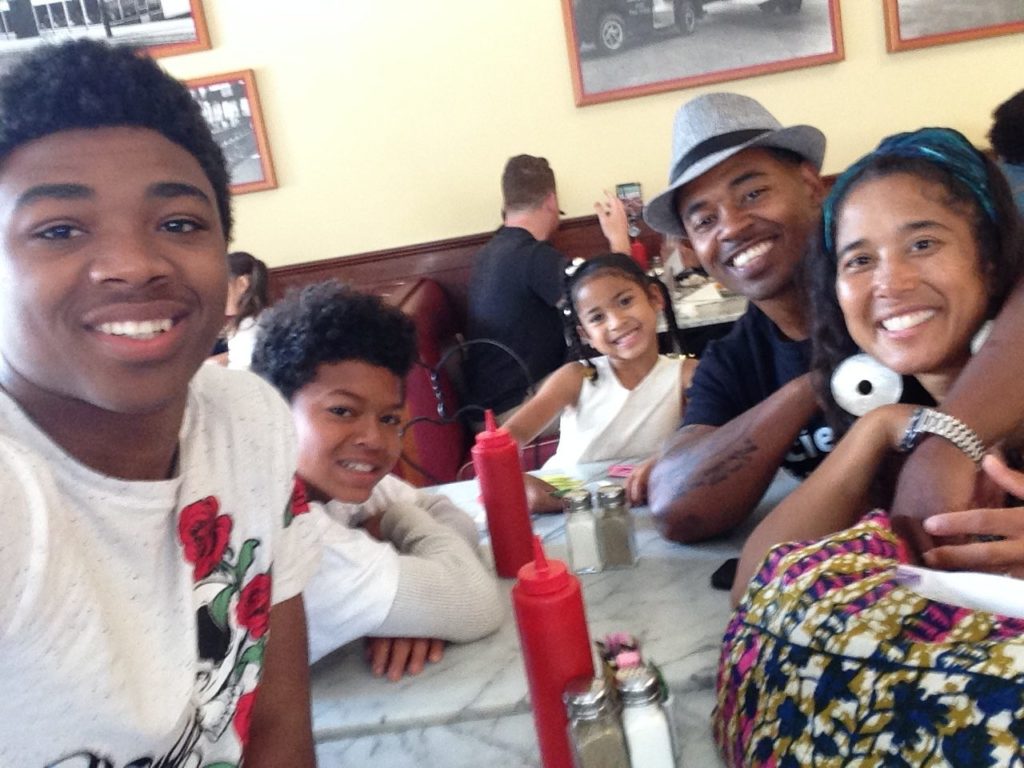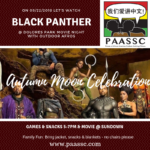Our Mandarin Journey: Meet the Ferreiras
Dawn and Jinho Ferreira are the parents of three amazing children: Pharaoh, age 17; Phoenix, age 12; and Phenom, age 6. Their youngest two have been enrolled in Mandarin immersion since kindergarten. Their eldest attended a Spanish immersion school where he was also introduced to Mandarin in the third grade.
Dawn is a Spanish teacher and a member of the equity design committee and the outreach committee at Yu Ming Charter School in Oakland. She and her husband both speak multiple languages, but Mandarin isn’t one of them. The Ferreiras have been members of PAASSC since it began.
Here’s a glimpse into their family’s Mandarin journey along with some nuggets of wisdom for parents considering a language immersion education, Chinese or otherwise.
Why did you choose a language immersion education for your children, and why Mandarin in particular?
Dawn: Everywhere we have traveled in the world has had a Chinatown. This speaks to the economic power associated with the language. We want to give our children access to power and open up doors for them that have been traditionally closed. If they want to pursue any career, knowing Mandarin will ultimately benefit them.
Also, the process of learning an additional language is helping them to build brain power in the areas of language, expression, problem solving, and decoding.
What’s the best part of the Mandarin immersion experience, from your perspective and also from your children’s?
Dawn: If you ask Phoenix, like most middle schoolers, he would say it’s his friends. Phoenix recently joined the school football team and really likes the friends he has made there, too. At the same time, I think our son recognizes that he is doing something important by learning Mandarin.
The way I see it, Phoenix has developed an adaptability that allows him to access different worlds. This school, although public, is similar to attending a private school with regard to the socioeconomic status of the people Mandarin immersion draws. He sees a variety of people with different stories, and he is able to relate well to them.
I love when I get messages from teachers when he does a presentation in class, and it blows his teachers away because he is able to speak in front of people without hesitation. Or when the students went away to camp and he was easily making friends with other students of other schools. Teachers get to see some of his strengths, and his people skills are valued.
Have there been any other challenges or drawbacks to your family’s Mandarin immersion experience?
Dawn: Yes, there are always going to be challenges. I felt like I was in battle for a while because teachers kept recommending special ed for my son because he was active. We found that they wanted children to sit still for long periods of time, and Phoenix needed more active time. We assuaged this situation by arriving at school early in order to provide Phoenix with play time before school started.
At the same time, these schools are giving my children an opportunity that I cannot personally give them. I have positioned myself as the Spanish teacher at my son’s school so that I can give him and other students at his school the experience of having a Black teacher. They can experience quality education from someone who brings culture and self into the classroom authentically and unapologetically. So I see myself as being a part of the solution.
What’s it like to check homework in a language you don’t understand?
Dawn: I am definitely open to my children teaching me Mandarin. They explain their homework to me. I imagine that on some small scale, this is what it is like for some immigrant families.
Do you supplement their language immersion with additional resources?
Dawn: Yes, we have them watch shows in Mandarin and practice with friends, neighbors, community members, and their cousins who are also studying Mandarin in Oregon.
My daughter is a super strong reader, but she was asked to join the summer boost camp to strengthen her Chinese before school started. It was a free week of camp that her school offered.
We once purchased some Looney Toons cartoons in Mandarin, but they were some racist cartoons that are basically banned in the U.S.
Has race or racism been an issue at any of your children’s schools?
Dawn: Yes. Fourth grade year, Phoenix was told that he couldn’t play because he was brown. Another time, he heard some kids say in a very elitist way that “Harriet Tubman couldn’t even read a book.”
This is where that self-love and knowledge of self is so important. Phoenix had the confidence to get through it, and he defended her, telling them that she could read the stars and quilts.
What was the school’s response?
Dawn: The school called me in, and his teacher, a darker-skinned Chinese woman, held a restorative justice circle for the students and discussed how she, too, had felt discriminated against within her own culture. At home, we had discussions with Phoenix about our own personal encounters with racism, and I encouraged him to write a book about his experiences.
Overall, how has your family enjoyed the experience of Chinese immersion education thus far?
Dawn: It has been challenging at times and rewarding at others, mostly rewarding. At times, we have no idea what is going on, so we have to ask a lot of questions.
If Phoenix is learning history in Mandarin, what kind of history is he learning? In elementary, we had to challenge “the Pilgrims and the Indians” dress-up day for Thanksgiving. It is a trip how white supremacy finds its way into curriculum. We have to balance what he learns in school with our history.
His math is on point, though. He is comfortable with other people of other cultures. I love when I see instances of him holding onto his own culture while participating in Chinese culture. For example, when he was in kindergarten, he sang the Stevie Wonder “Happy Birthday song” in Chinese.
What would you tell other parents who are considering a language immersion education, specifically in Mandarin?
Dawn: It is hard work! On the socio-emotional side, you must make sure your children love themselves. This morning, my daughter didn’t want to wear the knockers on her hair that she had picked out at the beauty supply shop. I didn’t understand; I immediately thought it was a race thing, that because she doesn’t see her friends at school wearing them and didn’t want to wear them.
I recommend an Afrocentric pre-school before entering this other world. Our children were blessed to have Mama Titilayo Makini and Mama Ajuana Black as their first teachers outside of the home. These two outstanding educators helped shape our babies both academically and culturally, reinforcing what we taught at home. I credit them as integral to our children’s success. And PAASSC!! And YGB (Young, Gifted and Black). And trips to Marcus Books. And everything cultural we can get our hands on.
Why did you join PAASSC, and what do you enjoy most about being a member?
Dawn: When Jamila told me she was interested in starting PAASSC, I was grateful that she recognized how important it was for our children to connect as they went through this journey together. We hosted a professional development panel for administrators that I thought was incredibly rich. The professional development and social gatherings are our favorite PAASSC activities. It feels good to know that we are not doing this alone.
“Our Mandarin Journey” is a new feature on the PAASSC blog. Each month, we will give one of our families a chance to share their experiences with Chinese immersion education along with a few tips for other parents who may be considering this educational path for their children.
If you would like to be interviewed for a future “Our Mandarin Journey” profile, please send an email to Jamila@paassc.com.


 Previous Post
Previous Post Next Post
Next Post




